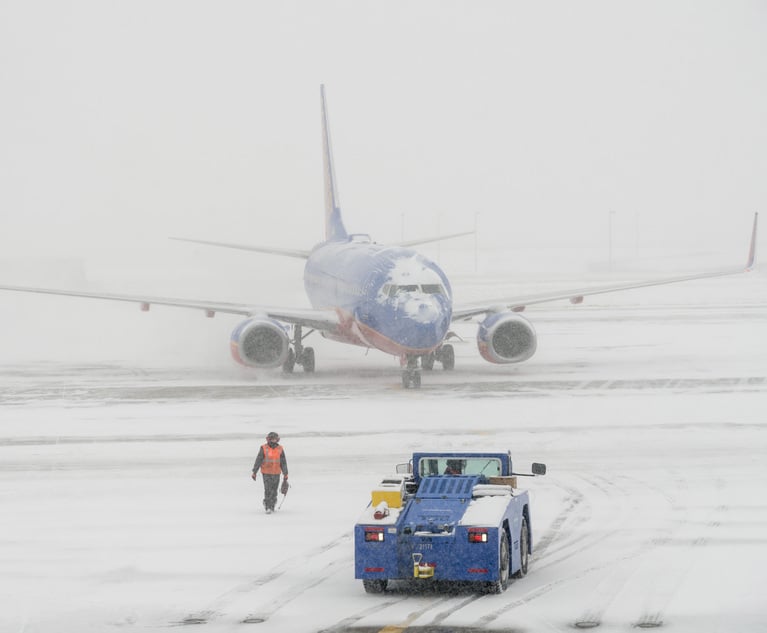JetBlue Agrees to Buy Spirit for $3.8B After Bidding War
The agreement came one day after Spirit's attempt to merge with fellow budget carrier Frontier Airlines fell apart.
July 29, 2022 at 01:10 PM
5 minute read
 Spirit Airlines air crafts at Fort Lauderdale-Hollywood International Airport. Credit: YES Market Media/Shutterstock
Spirit Airlines air crafts at Fort Lauderdale-Hollywood International Airport. Credit: YES Market Media/Shutterstock
JetBlue Airways has agreed to buy Spirit Airlines for $3.8 billion and create the nation's fifth-largest airline if the deal can win approval from antitrust regulators.
The agreement Thursday capped a months-long bidding war and arrives one day after Spirit's attempt to merge with fellow budget carrier Frontier Airlines fell apart.
Spirit CEO Ted Christie is being thrust into the awkward position of defending a sale to JetBlue after arguing vehemently against it, saying that antitrust regulators would never let it happen.
"A lot has been said over the last few months obviously, always with our stakeholders in mind," Christie said on CNBC. "We have been listening to the folks at JetBlue, and they have a lot of good thoughts on their plans for that."
JetBlue's case for regulatory approval rests on two main arguments: That its size makes it better positioned to force bigger airlines to reduce fares; and that it has already volunteered to give up Spirit gates and takeoff and landing slots at key airports in New York, Boston and Florida.
JetBlue CEO Robin Hayes said those concessions will let other low-cost carriers, including Frontier, bolster their presence and thus increase competition.
"The real issue here though is clearly what can we do in the U.S. to make a more competitive airline industry against the large, big four airlines," Hayes said in an interview. "We believe the most disruptive, the most effective thing that we can do is build a bigger JetBlue more quickly than we otherwise could."
Together, JetBlue and Spirit would have about 9% of the U.S. air-travel market. American, United, Delta and Southwest control about 80% when international flights are included.
Hayes said Spirit planes will be converted to JetBlue's configuration, which allows for more legroom and means there will be fewer seats for sale on each flight. He said JetBlue will increase the pay of Spirit employees.
JetBlue and Spirit have been talking for the past several weeks, mostly about things such as how Spirit can retain key employees while its fate is up in the air. The financial terms of the deal did not change after early July.
Shares of Spirit, based in Miramar, Florida, rose 4% in midday trading Thursday, to $25.31, still below the price that JetBlue is offering. JetBlue shares slipped 2%, and Frontier — seen as benefiting if Spirit disappears as a discount competitor — jumped 19%.
Spirit Airlines regularly ends up as the worst, or close to the worst, when airlines are ranked by the rate of consumer complaints. Still, some consumer advocates worry that fares will rise if it disappears.
Spirit and similar rivals Frontier and Allegiant charge rock-bottom fares that appeal to the most budget-conscious leisure travelers, although they tack on more fees that can raise the cost of flying.
"Spirit is going to disappear, and with it, its low cost structure," said William McGee of the anti-merger American Economic Liberties Project. "Once Spirit is absorbed [into JetBlue], there is no question that fares are going to go up."
Others, however, say that Frontier will grow — it has a large number of planes on order — and fill any gap left by Spirit in the cheapest segment of the air-travel market.
JetBlue and Spirit will continue to operate independently until the agreement is approved by regulators and Spirit shareholders, with their separate loyalty programs and customer accounts.
The companies said they expect to conclude the regulatory process and close the transaction no later than the first half of 2024. If that happens, the combined airline would be based in JetBlue's hometown of New York and led by Hayes. It would have a fleet of 458 planes.
JetBlue said Thursday that it would pay $33.50 per share in cash for Spirit, including a prepayment of $2.50 per share in cash payable once Spirit stockholders approve the transaction. There is also a ticking fee of 10 cents per share each month starting in January 2023 through closing to compensate Spirit shareholders for any delay in winning regulatory approval.
If the deal doesn't close due to antitrust reasons, JetBlue will pay Spirit a reverse break-up fee of $70 million and pay Spirit shareholders $400 million, minus any amounts paid to the shareholders prior to termination.
Spirit and Frontier announced their plan to merge in February, and Spirit's board stood by that deal even after JetBlue made a higher-priced offer in April. However, Spirit's board could never convince the airline's shareholders to go along. A vote on the merger was postponed four times, then cut short Wednesday when Spirit and Frontier announced they were terminating their agreement, which made a Spirit-JetBlue coupling inevitable.
JetBlue anticipates $600 million to $700 million in annual savings once the transaction is complete. Annual revenue for the combined company is anticipated to be about $11.9 billion, based on 2019 revenues.
NOT FOR REPRINT
© 2025 ALM Global, LLC, All Rights Reserved. Request academic re-use from www.copyright.com. All other uses, submit a request to [email protected]. For more information visit Asset & Logo Licensing.
You Might Like
View All
Aviation Attorney and Pilot Analyzes Jeju Air Crash, Potential Litigation Issues

Southwest Airlines Faces $100M Class Action Over Pay Periods


Securities Claims Against Lilium N.V. for Electric Plane Production Delays Fail to Take Flight, Federal Judge Holds
5 minute readTrending Stories
- 1Paul Hastings, Recruiting From Davis Polk, Continues Finance Practice Build
- 2Chancery: Common Stock Worthless in 'Jacobson v. Akademos' and Transaction Was Entirely Fair
- 3'We Neither Like Nor Dislike the Fifth Circuit'
- 4Local Boutique Expands Significantly, Hiring Litigator Who Won $63M Verdict Against City of Miami Commissioner
- 5Senior Associates' Billing Rates See The Biggest Jump
Who Got The Work
J. Brugh Lower of Gibbons has entered an appearance for industrial equipment supplier Devco Corporation in a pending trademark infringement lawsuit. The suit, accusing the defendant of selling knock-off Graco products, was filed Dec. 18 in New Jersey District Court by Rivkin Radler on behalf of Graco Inc. and Graco Minnesota. The case, assigned to U.S. District Judge Zahid N. Quraishi, is 3:24-cv-11294, Graco Inc. et al v. Devco Corporation.
Who Got The Work
Rebecca Maller-Stein and Kent A. Yalowitz of Arnold & Porter Kaye Scholer have entered their appearances for Hanaco Venture Capital and its executives, Lior Prosor and David Frankel, in a pending securities lawsuit. The action, filed on Dec. 24 in New York Southern District Court by Zell, Aron & Co. on behalf of Goldeneye Advisors, accuses the defendants of negligently and fraudulently managing the plaintiff's $1 million investment. The case, assigned to U.S. District Judge Vernon S. Broderick, is 1:24-cv-09918, Goldeneye Advisors, LLC v. Hanaco Venture Capital, Ltd. et al.
Who Got The Work
Attorneys from A&O Shearman has stepped in as defense counsel for Toronto-Dominion Bank and other defendants in a pending securities class action. The suit, filed Dec. 11 in New York Southern District Court by Bleichmar Fonti & Auld, accuses the defendants of concealing the bank's 'pervasive' deficiencies in regards to its compliance with the Bank Secrecy Act and the quality of its anti-money laundering controls. The case, assigned to U.S. District Judge Arun Subramanian, is 1:24-cv-09445, Gonzalez v. The Toronto-Dominion Bank et al.
Who Got The Work
Crown Castle International, a Pennsylvania company providing shared communications infrastructure, has turned to Luke D. Wolf of Gordon Rees Scully Mansukhani to fend off a pending breach-of-contract lawsuit. The court action, filed Nov. 25 in Michigan Eastern District Court by Hooper Hathaway PC on behalf of The Town Residences LLC, accuses Crown Castle of failing to transfer approximately $30,000 in utility payments from T-Mobile in breach of a roof-top lease and assignment agreement. The case, assigned to U.S. District Judge Susan K. Declercq, is 2:24-cv-13131, The Town Residences LLC v. T-Mobile US, Inc. et al.
Who Got The Work
Wilfred P. Coronato and Daniel M. Schwartz of McCarter & English have stepped in as defense counsel to Electrolux Home Products Inc. in a pending product liability lawsuit. The court action, filed Nov. 26 in New York Eastern District Court by Poulos Lopiccolo PC and Nagel Rice LLP on behalf of David Stern, alleges that the defendant's refrigerators’ drawers and shelving repeatedly break and fall apart within months after purchase. The case, assigned to U.S. District Judge Joan M. Azrack, is 2:24-cv-08204, Stern v. Electrolux Home Products, Inc.
Featured Firms
Law Offices of Gary Martin Hays & Associates, P.C.
(470) 294-1674
Law Offices of Mark E. Salomone
(857) 444-6468
Smith & Hassler
(713) 739-1250






